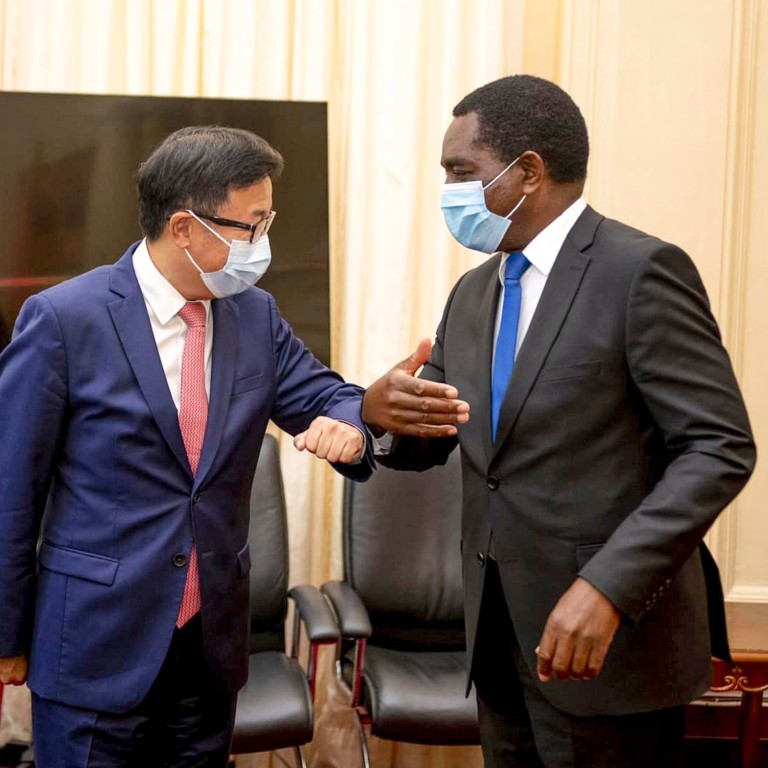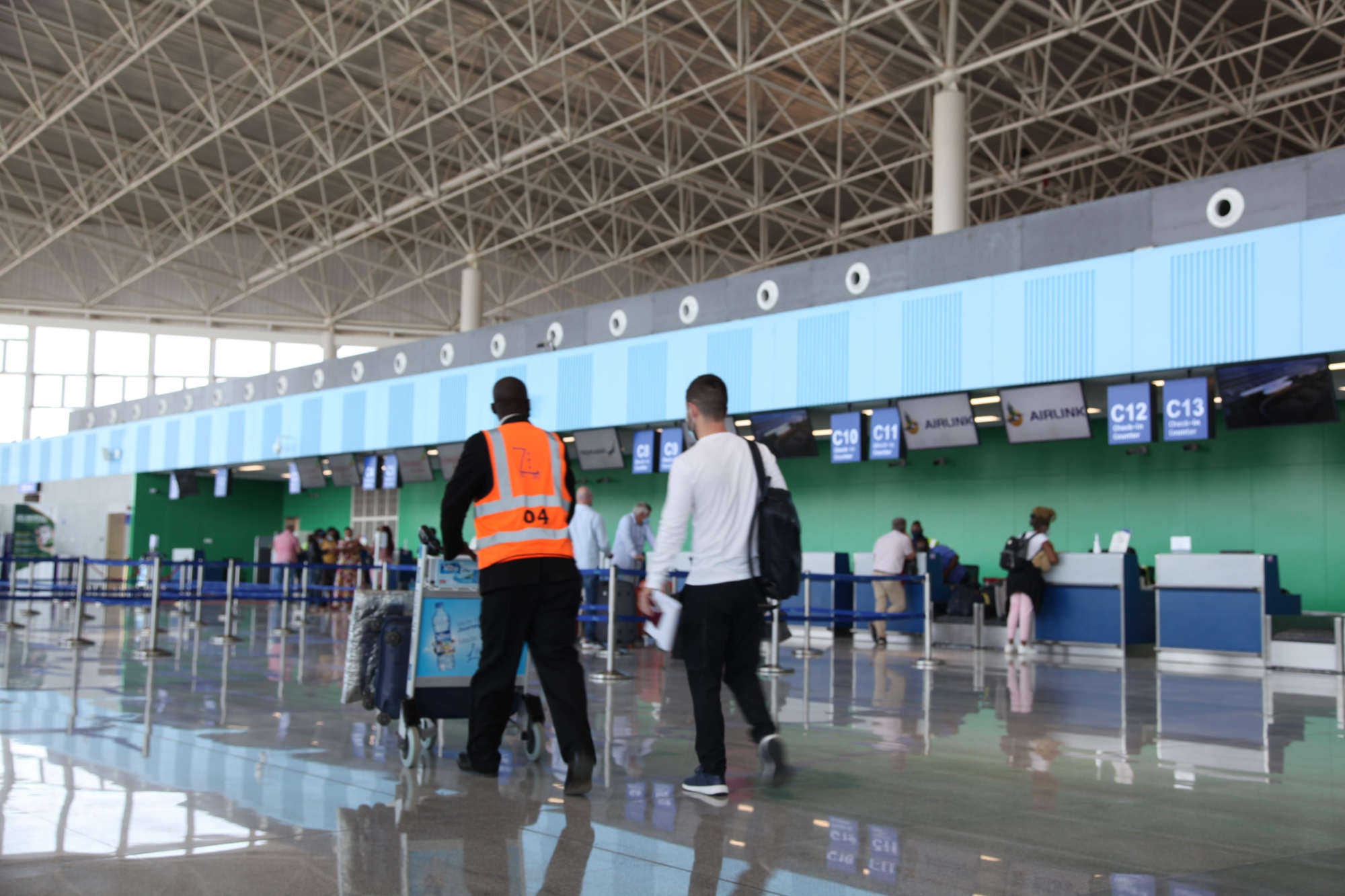
China urges IMF to approve US$1.4 billion Zambia bailout, but told it must reach deal with other lenders
- China is the African country’s biggest creditor and is a key player in efforts to resolve its debt problems
- The IMF insists that Zambia should get assurances from its creditors before it approves the relief package
China has urged the International Monetary Fund to approve a US$1.4 billion bailout for Zambia but the fund responded by telling Beijing and other official creditors they must first agree a relief package.
It has sought debt relief from the Group of 20 wealthiest nations and its top private creditors under the G20’s new “common framework” to help more than 70 developing countries with post-Covid debt restructuring and relief.
The process allows creditors to jointly renegotiate its foreign debt – even though China usually prefers bilateral negotiations.
The process has also been marred by delays since Zambia applied to join the G20 framework early last year.
Chinese envoy arrives in Zambia as another debt crisis looms for Lusaka
Hichilema thanked China for agreeing to co-chair the IMF Common Framework meeting with France, saying: “Zambia’s debt situation needs to be unlocked so that Zambia’s economy can be opened up.”
In a statement posted on his Facebook page, he also said: “We agreed to work closely to further strengthen an all-weather relationship.”
The president also said that he was “delighted” that a phone conversation he had had with his Chinese counterpart Xi Jinping “has already begun to bear fruit”.
Chinese lenders make up about a third or more than US$6 billion spent on mega projects in Zambia including airports, highways and hydropower dams.
The IMF has said the country must get assurances from its creditors for debt relief before it can approve a US$1.4 billion economic recovery package.
IMF deputy managing director Antoinette Sayeh visited Zambia on Wednesday to discuss the support programme, where she urged “creditors to provide financing assurances as soon as possible, as they are needed before staff can put forward Zambia’s programme for consideration by the IMF executive board”.
“This will allow Zambia to access fund resources, and also unlock access to critical financing from other partners, to help boost its economic recovery,” she said.
The common framework aims to help countries weather the storm of Covid-19 with debt relief and restructuring – but besides Zambia, only Ethiopia and Chad have applied to join the plan with most countries fearing that by seeking relief their credit rating would be downgraded by rating agencies.
Nations may face tougher debt relief talks over ‘hidden’ Chinese lending
On Thursday, Zambia presented its plan on how to get its debt under control and requested creditors to give assurances that they would provide relief that could unlock the IMF funding.
“[The Zambian] government presented to the official creditors the path envisioned for reaching debt sustainability and the support that will be needed from international partners, including initial assurances of debt treatment,” the finance ministry said in a statement after the virtual talks with creditors in Paris.
Observers said there was growing fear that whichever decision Beijing made, it could set a costly precedent in the continent where several countries were debt distressed.
Debt trap diplomacy used to ‘smear’ China, says ex-central bank governor
Scott Morris, a senior fellow at the Centre for Global Development think tank in Washington, said: “Chinese creditors do not want to be bound by a multilateral arrangement like the G20’s common framework and no doubt are worrying a lot about future cases.”
He said all parties would be watching this case closely to see if it helped set a precedent. “I think the result is that Zambia’s debt resolution will take longer than it should and might be more shallow than it should,” he said.
However, Patrick Curran, senior economist at Tellimer Research, said private creditors remained ready and willing to offer debt relief in Zambia, where there was little disagreement that debt was unsustainable and must be restructured.
However, he said the process had been slowed by official delays, with private creditors unable to launch discussions until the IMF shared its debt sustainability analysis and official creditors had launched discussions.
Curran said Thursday’s meeting represented a tentative step in the right direction, but ultimately there was a need for equal treatment for creditors and resistance by any lenders, such as China, to offer debt relief would cause further delays.

Zambia’s last international bond issuance dates back to 2015, and Curran said lending by bilateral and multilateral creditors had been the primary driver of Zambia’s unsustainable debt increase in recent years.
The common framework was launched with the explicit purpose that all creditors would share the burden of debt restructuring so “there needs to be broad agreement across creditors on the scale and composition of debt relief for a restructuring to be successfully completed”, he said.
W Gyude Moore, a senior policy fellow with the Centre for Global Development and a former Liberian public works minister, said that before China’s emergence as the world’s largest bilateral lender, the Paris Club handled these debt restructuring negotiations.
“It was thus inevitable that China would take a more prominent role in the multilateral debt talks, even though China historically prefers bilateral negotiations,” Moore said.
“China’s desire to be perceived as a positive actor in the international system ensures that it would have to step up. At the IMF World Bank meeting, there was persistent criticism that China was holding up the process.”
From Pakistan to Zambia, how does China pick its ‘ironclad’ friends?
He said China’s fear of setting an unfavourable precedent was legitimate because it stood to take the largest haircut in this process. But the process was usually on a case-by-case basis, so China was still able to negotiate restructuring that limited the applicability of any unfavourable precedents.
“The private sector will get a deal comparable to the one decided by the creditor committee. It does not seem likely that the private sector will reject the deal outright, especially if the details of the deal are available to all,” he added.

